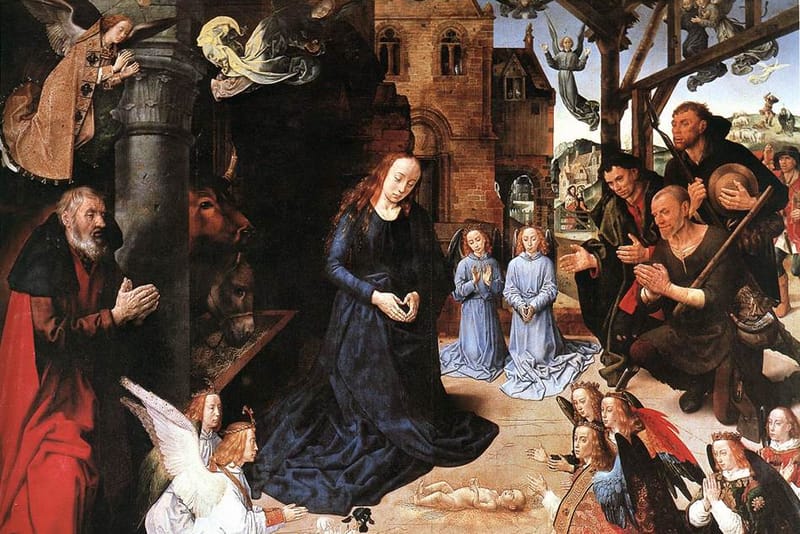Five Books for Catholics first posted a year ago, at the beginning of January 2023. To mark the service’s first anniversary and weigh up some of the results, this post shall survey the authors and books that, for one reason or another, have cropped up time and again.
- The Spirit of the Liturgy
by Card. Joseph Ratzinger - Jesus of Nazareth
by Benedict XVI - The Wellspring of Worship
by Fr. Jean Corbon - The Screwtape Letters
by C.S. Lewis - Introduction to the Spiritual Life
by Louis Bouyer - Bible Basics for Catholics: A New Picture of Salvation History
by John Bergsma
Some authors have featured repeatedly because several of last year’s interviews covered similar ground, such as the liturgy or Scripture, and their works have become classics within the field or good introductions for the general reader. Some authors have also popped up in two or more interviews on disparate subjects.
The first two books that have recurred repeatedly are by Pope Benedict XVI.
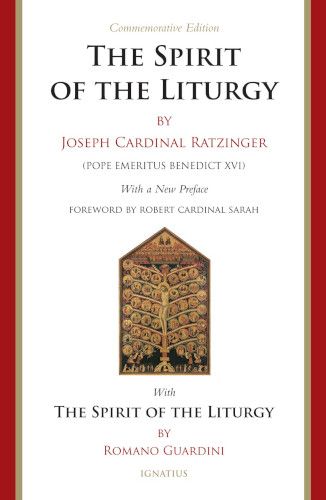
1.
Joseph Ratzinger’s The Spirit of the Liturgy must be a modern classic as it featured in the shortlists on the sacraments and sacred liturgy and sacred art.
Prof. Roger Nutt listed it as one of his recommended books on the sacraments for its treatment of the liturgical dimension.
“In less than 250 pages, you receive a very deep appreciation for the substantive liturgical questions and of the way in which a deeply Catholic theologian treats these topics.”
He went on to note that, “If there is just one take-away from The Spirit of the Liturgy, it is that many of the basic facets of the Church’s sacramental liturgy throughout the ages are extensions of basic truths of divine Revelation, and not that of, say, political preference or taste.”
"All in all, Benedict XVI is the author who featured most prominently in this year’s articles."
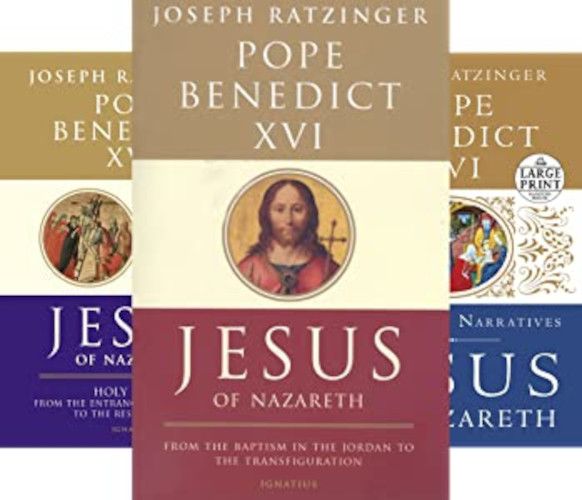
2.
One or other of the three volumes of Benedict’s XVI’s Jesus of Nazareth featured in the list of recommended readings of Lent, Holy Week, Easter, Advent and Christmas since they provide illuminating, accessible commentary on the main Gospel passages of these liturgical seasons. Jesus of Nazareth was also one of the recommended books on the principles of biblical interpretation. Jeffrey L. Morrow explained why he included it.
“Since the eighties, Cardinal Ratzinger had been calling for a theological and historical interpretation of Scripture from the heart of the Church. In his 1988 Erasmus Lecture, “Biblical Interpretation in Crisis” and the subsequent discussion in New York, he argued that if traditional Christian exegesis is A and modern scholarly historical exegesis is B, we do not want to go back and ignore B. Nor can we just do B alone. There are too many problems with it. Rather, we need to develop exegesis C, which takes seriously the best of both A and B. This is what Benedict XVI does in Jesus of Nazareth. That is why it is such an important text.”
While The Spirit of the Liturgy and Jesus of Nazareth cropped up on several lists, they were not the only books of Benedict XVI to be recommended. Over a range of different subjects, one or other of his books was selected.
Michael Root singled out Benedict’s encyclical Spe salvi as an important text on eschatology. Petroc Willey included a collection of Joseph Ratzinger's addresses on catechesis, whereas Thomas P. Scheck included Benedict XVI's catecheses on Origen as a valuable guide to the great Alexandrian theologian.
A collection of his talks, A Reason Open to God: On Universities, Education, and Culture, topped Jared L. Staudt’s recommended readings on Catholic education.
“In my mind,” Staudt explained, “Pope Benedict has articulated the Church's whole tradition of education: the recent magisterium both from the last one hundresd years and even back to the Early Church. He has articulated that vision better than anyone else.”
All in all, Benedict XVI is the author who featured most prominently in this year’s articles. This is a testimony to the power, depth, and range of his thought. In the interview published to commemorate the first anniversary of his death, Prof. Tracey Rowland surveys his work.
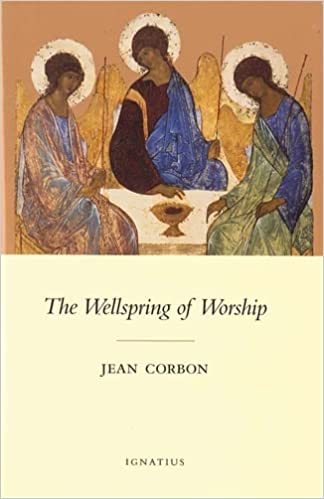
3.
Benedict XVI’s The Spirit of the Liturgy was not the only modern classic on the subject to feature repeatedly. So did Fr. Jean Corbon’s The Wellspring of Worship. It made David Fagerberg’s shortlist on liturgical spirituality and Christopher Carsten’s on sacred liturgy. Both recommend the book for the beautiful meditative style in which it is written, but above all for how it gets to the heart of the liturgy: the Trinity acting in the world and transforming it.
Fr. Corbon is an author whom we have likely read and admired without knowing it. He was the author of two sections of the Catechism of the Catholic Church: the section on liturgy and the part on prayer. Besides recommending The Wellspring of Worship, Christopher Carsten also shortlisted the section of the Catechism on the liturgy that Corbon drafted.
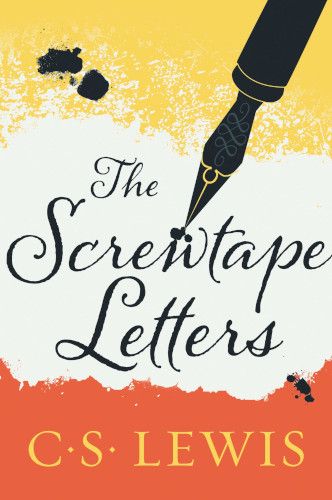
4.
C.S. Lewis’s The Screwtape Letters is a fourth book that has featured on different shortlists. Fr. Timothy Gallagher recommended it as one guide to the discernment of spirits, whereas Fr. Michael Ward included it in his list of Lewis’s top five books.
“It’s an exploration of the psychology of temptation,” Fr Ward explained. “It has a lot of moral and spiritual insight, but also a great amount of psychological insight. It demonstrates Lewis’s skills as an as a novelist and the observational powers that he had as a writer.”
“Lewis can get away with presenting standard moral teaching, which might otherwise come across as platitudinous. Because it is presented so wittily, we accept it. We even enjoy it. We laugh at ourselves, not just at the demons, for falling for the stratagems of these of these wicked creatures. In other words, Lewis, as it were, puts a rim of honey around the medicine glass and we swallow the medicine, hardly realising that it is doing us any good. But it is. It does a great deal of good. It certainly does me a lot of good and I try to read The Screwtape Letters once a year, especially during Lent. It’s a very good moral mouthwash—a fantastically spirited book, in every sense of the word.”
Like Benedict XVI, Lewis has been recommended on a range of subjects.
His The Great Divorce was one of Michael Root’s top five books on eschatology because “Lewis makes imaginatively understandable the possibility that some may simply prefer a life apart from God.”
Holly Ordway’s top five books on imaginative apologetics included two works by Lewis, one directly, the other indirectly.
Directly, she recommended Lewis’s An Experient in Criticism for the way it teaches us how to read effectively.
“As apologists, the temptation is always going to be to move immediately to using literature. How can I use this text to show this or that point about the faith? There is nothing wrong with that, in itself. It becomes wrong when it is the only way that we approach the text. Then, we miss what literature is. It is not just a tool. It is an experience.”
“In An Experiment in Criticism, Lewis teaches us how to receive literature and how to enter into it.”
Lewis’s The Chronicles of Narnia also featured in Holly Ordway’s top five books on imaginative apologetics, albeit indirectly. It featured by way of her recommendation of Fr. Michael Ward’s Planet Narnia: The Seven Heavens in the Imagination of C.S. Lewis. This book is a study of the Christian significance of the planetary symbolism that underlies each of The Chronicles of Narnia.
“This is a great case study of why The Chronicles of Narnia are so powerful,” Ordway explained. “It is not just about popping in a Christ figure into an otherwise ordinary story. If that were the case, Narnia would be forgotten, like so many other books of the of the 1950s. Why has it lasted? Because there is a real coherence to it.”
“Appreciation for the exhaustive wisdom of Bouyer has never waned among some. It is returning for others, and is growing."
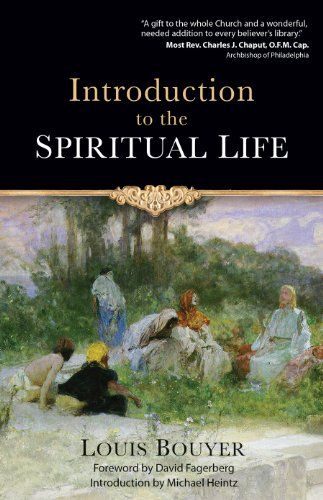
5.
Fr Louis Bouyer was another author who kept coming up in the interviews on matters liturgical, whether it be the liturgy itself or liturgical spirituality.
“Appreciation for the exhaustive wisdom of Bouyer has never waned among some,” David Fagerberg noted. “It is returning for others, and is growing, in my opinion. He was accomplished in liturgical studies, patristics, ecclesiology, the Fathers, Scripture and its interpretation, cosmology, ethics, and mystery theology. I should revisit that first entry. Not only did he know the history of liturgy, and the methods being used to investigate it, I find that he thinks as a liturgical theologian. Therefore, his spirituality is a liturgical spirituality.”
From the various books of Bouyer's that were recommended, we have selected his Introduction to the Spiritual Life.
You can read more about Bouyer in the interview on his work.
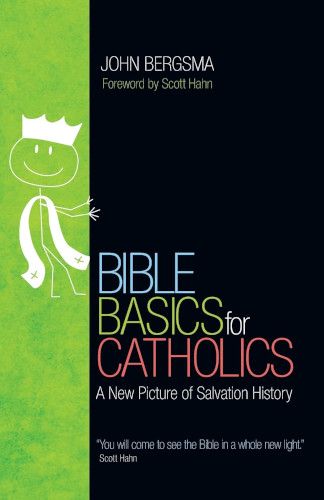
5.
John Bergsma’s Bible Basics for Catholics: A New Picture of Salvation History was a recommended book on the principles of biblical interpretation. It also featured on the list for Lent.
It featured in the Lent selection because it can help us cover the same sort of catechesis that the Church Fathers imparted to those preparing for baptism in the run up to Easter. In what was called the narratio, they explained the key moments of the Old Testament and how these were brought to fulfilment in Jesus. Bergsma’s book does much the same thing for today's reader. It explains the five covenants that God makes on mountains with his chosen mediators in the Old Testament— Adam, Noah, Abraham, Moses, David—are brought to fulfilment in the covenant he makes with Christ on Calvary. In this way, Bergsma outlines the overarching story of Sacred Scripture.
Jeffrey L. Morrow included it in his top five books on the principles of biblical interpretation for much the same reason and stressed its accessibility to readers of all ages.
“I cannot think of a more basic, faithful, accessible, and exciting introduction to this than John Bergsma's Bible Basics for Catholics.”
Another of Bergsma’s books made the Jeffrey L. Morrow top five books on biblical interpretation: A Catholic Introduction to the Bible: The Old Testament coauthored with Brant Pitre.
“If you really want to understand how to read the Old Testament as a Catholic, there is no better introduction,” Dr. Morrow commented. “It explains what each book of the Old Testament is about, how the Church Fathers read it, and how we should read it at the literal or historical level. It even gets into modern scholarly debates and the challenges to modern scholarship. It looks at the archaeological evidence, the difficult portions of the Old Testament, important theological themes, and how these books play out in the liturgy.”
Fittingly, John Bergsma’s interview on the Pentateuch was the first post on Five Books for Catholics.
Among the books that Bergsma recommended was A Father Who Keeps His Promises, by Scott Hahn, another biblical scholar whose work was recommended in various interviews. Steve Ray included Hahn’s commentary, coauthored with Curtis Mitch, in his list of books on Genesis. Jeffrey L. Morrow recommended several of Hahn’s books in his two part interview on biblical interpretation (pt. 1) (pt. 2).
These then are the authors and books that happened to pop up repeatedly last year. Maybe some new ones will crop us this year. What matters most, though, is that the interviews and articles continue to provide valuable insights and recommended readings on a wide range of subjects. Fingers crossed and God willing.



